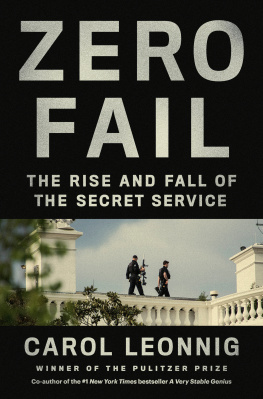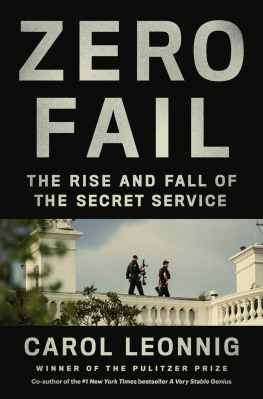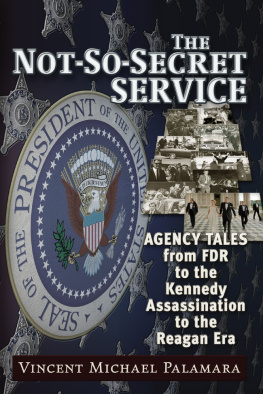Connect with Diversion Books
Connect with us for information on new titles and authors from Diversion Books, free excerpts, special promotions, contests, and more:

@DiversionBooks

www.Facebook.com/DiversionBooks

Diversion Books eNewsletter
Copyright
Diversion Books
A Division of Diversion Publishing Corp.
443 Park Avenue South, Suite 1008
New York, NY 10016
www.DiversionBooks.com
Copyright 2015 by The Washington Post
All rights reserved, including the right to reproduce this book or portions thereof in any form whatsoever.
For more information, email
First Diversion Books edition May 2015
ISBN: 978-1-62681-879-8
Letter of Introduction
January 21, 2015
To the Judges
Rarely has any journalist penetrated the Secret Service, one of the worlds most locked-down organizations. Yet The Washington Posts Carol D. Leonnig did just that, turning out story after story exposing serious security lapses and official misconduct. This long-revered agency, Leonnig revealed, was not living up to its most solemn duty to keep the president safe.
The Secret Service was anything but forthcoming about its flaws. At times, it engaged in deception to avoid scrutiny. It was routinely unresponsive to Leonnigs inquiries. And still, The Posts reporting has been repeatedly affirmed.
The power of Leonnigs reporting was especially apparent over two remarkable weeks in the fall. In the days after a man leapt the White House fence on Sept. 19 and ran inside the mansion. The Post was the first to document numerous lapses, including the failure of a perimeter surveillance unit to identify the intruder, the attack dog that an officer never released, and the alarms that had been muted. Later that month, Leonnig broke yet more news regarding the fence jumper: Despite Secret Service statements that the intruder had been stopped immediately inside the front door, the man had in fact raced through much of the mansions main floor before being tackled in the East Room. In a subsequent scoop, Leonnig reported that the intruders capture was partly luck; he was tackled by an off-duty agent who happened to be walking through the mansion.
In late September, Leonnig produced her penetrating account of the Secret Services bungled response to a 2011 shooting attack on the White House. Her report showed for the first time that supervisors had disregarded accounts from agents who believed that bullets had struck the residence, that President Obamas mother-in-law and daughter Sasha had been home at the time, and that the first couple were not told immediately and were incensed about the response.
Earlier in the year, Leonnig disclosed Operation Moonlight. Agents who were supposed to be working exclusively on a White House surveillance unit had been sent to rural Maryland to monitor a neighborhood dispute involving the directors administrative assistant. Late in the year, an investigation by the Department of Homeland Securitys inspector general found that the operation was a serious lapse in judgment. The Secret Service said its records showed the operation lasted only days while several agents remembered it lasting many weeks as both the Post and the IG noted but the inspector general concluded that, however long it went on, there was no justification for it. He said: These agents, who were there to protect the President and the White House, were improperly diverted for an impermissible purpose.
At a Sept. 30 hearing, members of the House Oversight and Government Reform Committee repeatedly read aloud from The Post as they questioned Secret Service Director Julia Pierson. Rep. Jason Chaffetz (R-Utah) said he was thankful for The Posts work. Rep. Elijah Cummings (D-Md.) read from Leonnigs account of how an officer on the scene of the 2011 White House shooting who thought she heard bullets strike the mansion described her fear of being criticized if she contradicted her supervisors. Cummings prodded Pierson to ultimately concede that the officer was right. The New York Times published an editorial that evening titled The Collapse of the Secret Service, citing The Post four times for its unsettling revelations. Pierson resigned the next day.
Reporting on an agency that stonewalls journalists at nearly every turn is hugely challenging. And Leonnigs huge and important volume of work on the Secret Service included one error. The Post reported that an armed private security guard who had not been screened by the Secret Service had been permitted onto an elevator with President Obama during a visit to Atlanta. That was correct. The Posts story, however, described the unidentified guard as a convicted felon. He had not been convicted; he had been arrested. The Post published a corrective story immediately upon learning of its error. The central, and unnerving, point of the original story remains: An unauthorized armed man had breached what was supposed to be the worlds tightest security ring. Acting Director Joseph Clancy told the House Judiciary Committee in November, a month after The Posts report, that a lack of due diligence led to the incident and that the Secret Service on that day had failed our procedures. Questioned more broadly by angry lawmakers about false Secret Service statements made amid Post revelations about other security lapses, Clancy assured them that, I have the same outrage as you.
Weeks later, a top-to-bottom Department of Homeland Security review prompted largely by The Posts reporting echoed much of Leonnigs cumulative findings citing widespread distrust of management among the rank and file, staffing decisions that led to security gaps, and scaled-back training that left many officers unprepared for an intruder. The government report was unusually scathing as it described a dysfunctional Secret Service that is starved for leadership and stretched beyond its limits, and it called for sweeping changes. In response, Acting Director Clancy forced out or accepted resignations from most of the agencys top managers, declaring, Change is necessary to gain a fresh perspective on how we conduct business.
Leonnigs reporting, based on trust she had built with a broad range of sources, offered an unprecedented window into the flaws of an agency that once seemed picture-perfect. Many agents and officers spoke to her at risk to their livelihoods. The impact of her groundbreaking work cannot be underestimated: This president, and future presidents, will be safer. We are proud to nominate this work for the 2015 Pulitzer Prize for National Affairs.
Sincerely,
Martin Baron
Executive Editor
Secret Service fumbled response after gunman hit White House residence in 2011
September 27, 2014
The gunman parked his black Honda directly south of the White House, in the dark of a November night, in a closed lane of Constitution Avenue. He pointed his semiautomatic rifle out of the passenger window, aimed directly at the home of the president of the United States, and pulled the trigger.
A bullet smashed a window on the second floor, just steps from the first familys formal living room. Another lodged in a window frame, and more pinged off the roof, sending bits of wood and concrete to the ground. At least seven bullets struck the upstairs residence of the White House, flying some 700 yards across the South Lawn.
President Obama and his wife were out of town on that evening of Nov. 11, 2011, but their younger daughter, Sasha, and Michelle Obamas mother, Marian Robinson, were inside, while older daughter Malia was expected back any moment from an outing with friends.










 @DiversionBooks
@DiversionBooks www.Facebook.com/DiversionBooks
www.Facebook.com/DiversionBooks Diversion Books eNewsletter
Diversion Books eNewsletter